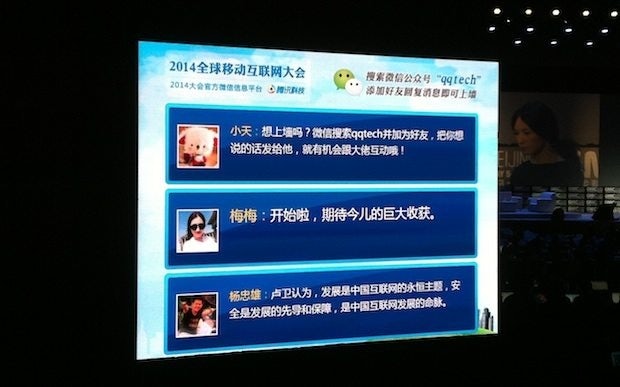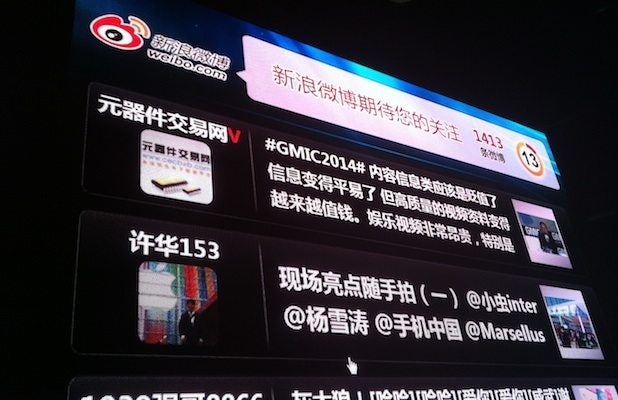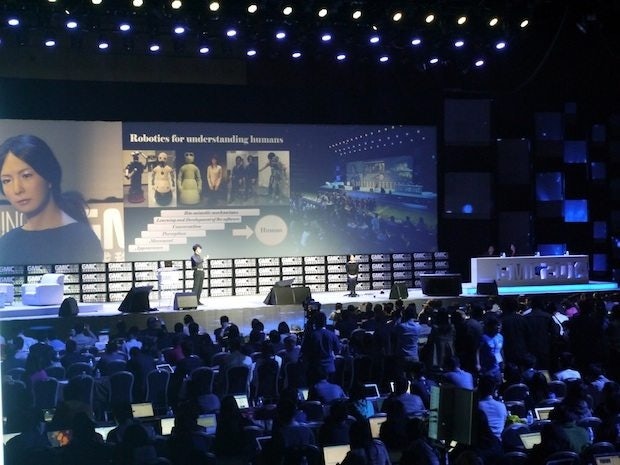
You could pretty much be anywhere in the world to attend an event by GMIC (Global Mobile Internet Conference), which features events in Silicon Valley, Tokyo and Delhi. From May 5 to 6, the massive mobile internet industry gathering held its Beijing conference to cover the latest trends and developments in this important sphere. GMIC’s theme, “Mobilizing the Next 5 Billion,” highlighted key topics and markets such as mobile gaming, smart devices, mobile finance, mobile marketing and innovation.
Beyond the very Chinese crowd in the presentation area, which seated about 3,000 people, two additional indicators didn't lie about the importance of mobile and social technology in the China market: on each side of the stage, two big LED screens showed WeChat and Weibo feeds.

WeChat's feed on display at the conference. (Laure de Carayon)
Back in April, two guests of CNN program In China gave the tone of the market and things to come:
Andy Tian, CEO of mobile startup Asia Innovations said,
"The government is actively molding entrepreneurial innovation here all the way from loosening restrictions for new companies to reducing the annual audit requirement. Politics and innovation are actually aligned," as well as "China's home market is intense in their mobile usage” and is "one of the hardest consumers to get money from."
Tina Tao, COO of Innovation Works, a renowned Chinese start-up incubator stated,
"China’s mobile developers have adopted things not only from their local market, but from the internet culture of other countries. So they have grown up with the global concept and global culture from day one,” and "We always say the idea is worthless, you need execution and don't worry about your idea being copied by others. Otherwise, even if you have a good idea in the first place, you cannot succeed."
These asssessments made In China host Kristie Lu Stout conclude with the same idea that is the China's mobile maven’s mantra: "Execute fast, or die.” For those (still) wondering about the existence of a “China Valley,” a tour of GMIC certainly gave an answer.
China’s tech giant rivalry exacerbates as Baidu, Alibaba, and Tencent, drive the country’s mobile upheavals. China reached 618 million internet users in 2013, including 80 percent connecting via mobile (500 million), 86 percent using an app such as WeChat, 70 percent watching videos on tablets and phones, and 42 percent using mobile to make payments.
Below are some of the key trends for China’s mobile market discussed at this year’s Beijing conference.
M#
obile internet upsets traditional state companies#
From banking products to TV content or transport services, many industries controlled by state-run companies are under "pressure" from private enterprises. For example, more private video portals will produce their own content and not just rely on TV programs whose license fees experience exponential increases. Baidu-backed video platform iQiyi was the latest to make the announcement that it would do this.
Meanwhile, online financial services exclude the need for a "bank deposit" box and take revenue for mobile operators. Yu’LE Bao (Alibaba), an online-only bank, offers an annual interest of 6 percent; in less than a year, it has attracted more than 81 million investors and nearly $90 billion in deposits. It can touch people in Tier 3 and 4 cities before the banks do, showing that digital finance is one of the most disruptive new technologies.
In addition, Zhou Hang, CEO of taxi app Yongche.com, joined the exploding taxi app market, along with Didi or Kuaidi. According to him, “You do not need to buy a car, it will just be a simple object you order [by voicemail] when you need it."
Mobile gaming madness#
An important element of the “next 5 billion” coming online via mobile is mobile gaming. The market has exploded in 2013 and counts 300 million players on smartphones, but only 80 games generate more than 1 million RMB per month, and only 20 games more than 10 million RMB per month. The three public operators China Mobile, China Unicom, and China Telecom announced the "Double 100" program to open platforms and provide a better environment for developers to distribute their games. "Double 100" will support 100 games with the objective to make 1 million RMB or more a month. In addition, the country has long prohibited the use of gaming consoles, but its recent authorization let Microsoft announce Xbox's launch for September 2014.
Connected cars: the other Baidu-Alibaba-Tencent battlefield#
On the panel “Opportunities in Mobilizing Automobiles,” Zhou of Yongche, said, "Chinese auto companies feel a lot of pressure. The automobile industry lags far behind the expectations of our (internet) users,” and for the CEO of Chexiang.com, the key to success is that "we need to provide accuracy. Accuracy is the data.” After Baidu had announced the creation of CarNet at Beijing Auto Show, Tencent
—#
for whom "cards are the foundation of mobile internet”
—#
launched Lubao, a box that works with smartphones and offers an "eco-driving (consumption/price ratio/auto diagnostic) experience with an app that provides real-time traffic info, incident data, navigation, street view GPS, driving behavior analysis, and WeChat integration. Alibaba also recently bought geolocalization and card service AutoNavi.

Yongche.com makes its mark on China's biggest mobile tech conference. (Laure de Carayon)
Tencent-WeChat/Sina-Weibo rivalry:#
Weibo’s CEO Gaofei Wang#
in his own words
“I hope that people can have access to all the information they’re interested in on Weibo. They don’t need to watch TV, they don’t need to read newspapers, and they don’t need to access other channels of public information,” said Weibo CEO Gaofei Wang. He doesn't underestimate the decline in time spent on the microblogging platform in part due to WeChat’s rise, and it is clear to him that "China’s internet reports have shown that communication is always in the first place, while second is getting information and third is search.” Addressing whether or not WeChat presents more potential than Weibo in this regard, he said that "Weibo is the source of all public information" as opposed to O2O conversations. Wang thinks "the market is open,” and is more interested in “the hundreds of millions living in Tier 2 and 3 cities” than in the creation of the “5 billion dollar product,” he said, referring to the theme of the conference. He concluded, “we will develop our own competitiveness.”

The enormous Weibo feed at GMIC's Beijing conference. (Laure de Carayon)
Wearables offer frictionless sharing#
JWT Shanghai Chef Digital Officer Eugene Chew described wearables at the number one trend of the future of mobile and social for 2014. Wang Xiaobin, CEO of inWatch believes so as well, as he chose “Be Future” as the brand’s signature. Meanwhile, Sonny Vu, CEO of Misfit Wearables, introduced the recent launch of Shine, an elegant fitness and sleep monitor for men and women. This brand’s top clients are Chinese.
The conference also examined the possibility of Chinese women’s preference for wearables at the talk "Mobilizing the Most Fashionable Ladies’ Life." One panelist claimed that women's preference for wearable technology such as smart watches will be affected by the idea that "they are very subjective," which "has to do with Chinese culture.”
Toward more humanlike conversations?#
"We need to bring emotion into the internet intelligence,” said Japanese Professor Hiroshi Ishiguro, director of the Intelligent Robotics Laboratory at Osaka University. Recently named one of the 50 most influential scientists in Asia, he made a unique impression at GMIC in a very packed room, discussing questions such as, “Can androids be more human-like than humans?” The scientist had his answer, demonstrating how real and virtual worlds will soon blur (which was also listed as JWT’s number two tech trend for 2014) as we witnessed the android on stage reply to him in a short Q&A session. “We’ll soon have an android society; we’ll use them to mimic human interactions: avatars will deliver messages to sick people, visit conferences, and work in department stores,” he said. Therefore, he questioned what he thinks is the next frontier: what is it to be human, to have a mind, a soul, or a heart?

Japanese Professor Hiroshi Ishiguro's android Q&A presentation. (Laure de Carayon)
Search and health: trending#
Shenma (神马,English: “What?”), an email/search/browsing app “built for mobile, with an aim to solve mobile search needs through interesting and usable mobile search experience,” according to the company's description, was officially launched in April in a joint venture between mobile browser UCWeb and Alibaba—rumors say UCWeb owns 70 percent and Alibaba has 30 percent. "In the future, text will be smaller and smaller. It will be voice. Your search engine has to adapt. The [names of] search engines on PC should be different from those on mobile. In the mobile search arena you want to have a clean result," said Yu Yongfu, the CEO of former close Baidu partner UCWeb. In his punchy talk, he also implied that Baidu apparently tried to slow down the company's success by blocking it. He stated, "we were eliminated on Baidu findings.”
UCWeb sales amounted to RMB 300 million in 2013, and targets are of RMB 1.5 billion in 2014 following the joint venture announcement. 100 million users were registered after a month, and forecasts are 200 million by the end of 2014.
Mobile health is also a trend to follow. Thanks to the increase in mobile internet speed (4G is accessible in major cities and mobile data growth is of 61percent a year), the number of integrated sensors for smartphones and tablets have increased (helping check inflammation or detect cancer cells). The mobile health market was estimated in late 2012 to more than $6.6 billion and is expected to grow to over $20 billion in 2014.
Every year is "the year of mobile#
”#
As "80 percent of revenues are still from desktop" according to Zhang Chen, the VP of Yahoo and Managing Director of Yahoo’s Beijing Global R&D Center, we'll likely hear this phrase again. But the mobilization of China and the world is on fast tracks, and one presenter spoke loud and certainly believes "his" year has come. "User experience is paramount to everyone
”#
said InMobi Ceo Naveen Tewari about native advertising. “Experience” was indeed probably the most-repeated word during the two-day event.
Laure de Carayon is the founder and organizer of China Connect, the largest gathering of experts on Chinese consumer trends, marketing, digital and mobile in Europe. China Connect was a supporting partner of GMIC 2014. Follow her on Twitter at @laure2carayon, and receive updates from ChinaConnect at @ChinaConnectEU.